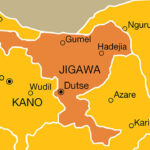
In its issue of August 1, 2017, the Daily Trust published an editorial, No to state police.
It is the reason I am reluctantly returning to this needless and tired argument.
The paper advised that “Given the country’s state of political development, we also caution against establishment of state police. If the federal government under the current arrangement finds it difficult to tame the excesses of some state governors, the situation is better imagined when such governors have state police at their disposal.”
The Inspector General of Police, Ibrahim K. Idris, made the same argument when the six-man committee set up by the Nigerian Governors Forum to canvass the need for state police met him to, perhaps, solicit for his support. He denied them his support. Idris told them that “Nigeria does not yet have the political maturity for state police.”
My heart ached. This dog-eared argument has many takers, of course. As a Nigerian, I feel insulted each time a thingamabob makes a magisterial pronouncement to the effect that our country is not politically mature to do whatever. Nigeria must be the slowest politically maturing country in the world. This country is more than 100 years old. It is 57 years old as an independent nation. Time enough to mature politically, I would think.
Nigerians and only Nigerians in agbada or khaki, have been the lords of this manor of disputatious citizens for 57 years. I am not aware of the country applying to the British to return because we found, to our embarrassment, that we are not politically mature enough to handle our own affairs as an independent nation. Sure, independence has not quite delivered on all its promises to the Nigerians. No independence does. In the inevitable teething challenges of managing our affairs post independence, we made mistakes of the head and the heart, not because we were immature but because we were, all things considered, only human.
We may not have turned our country with its fabled oil wealth into a paradise on earth but the redoubtable men who fought for our independence did not contemplate the possibility of our country becoming a paradise on earth. That, of course, would defeat the reason for our religiosity and shut the door in the face of expectations of paradise in the hereafter. But we have surely made tremendous progress in spite of ourselves. So, why do we derive pleasure from showing lack of faith in our country and ourselves?
This argument about the lack of maturity can be carried to any level, including the ridiculous. Admittedly, not many of our politicians are mature or responsible. And many, if not all, of our state governors have problems with appreciating the fine nuances of democracy versus dictatorship. Political immaturity or a warped sense of leadership? Or both? The detritus of military rule is embedded in the psyche of these men who invariably see themselves as civilian military governors.
The poor leadership on the part of our politicians and political leaders does not make a good argument for banishing politicians and instituting a government without politicians. Every human institution is vulnerable and subject to egregious abuse by those who run them. Still, nations build institutions and staff them, not with angels, but with human beings.
The Nigeria Police Force advertises itself as our friend but we know it is not a friend of the poor but of the rich and the influential. Would it be fair to suggest that because of the corruption and the oppressive use of the police against the poor and the powerless, its personnel are not mature enough to police us?
There is a human tendency for people to act in excess of their legitimate powers. Laws with prescribed consequences for their breach are made precisely because human beings need to be dissuaded from exceeding their legitimate limits.
The fear of the possible abuse of state police by state governors is legitimate. But it is profoundly irrational. We should not let it becloud our reasoning. The worsening insecurity is worse than the feared excesses of the state governors. In giving effect to this fear, we create the impression that our country has always had a single federal police. Not so.
We had the native authority police in every native authority in the Northern Region in the First Republic. Each native authority, renamed local government throughout the country by the military, recruited, trained and fully funded its own police. Each of them owned their prison services too. Were we more matured then than now? The generals disbanded the native authority police and absorbed some of its qualified personnel into the Nigeria Police Force and created a single federal police force. It served its purpose then; it is unhelpful now.
I recall that in the regional capital, Kaduna, and other major towns in the north, we had the special constabulary, perhaps today’s equivalent of civilian police. It gave middle ranking civil servants a chance to help the police in policing the streets at night. No one ever trusted security to only one security outfit.
The state governors are not pushing for state police because they want a tool for the oppression of political opponents and the suppression of the legitimate rights of the people. They currently use the Nigeria Police Force to achieve those unholy objectives. They cannot do much worse with state police established, funded and commanded by the state under a law that would limit their possible excesses.
The danger in sticking to the single federal police is that state governors who are increasingly frustrated by the inability of the Nigeria Police to provide adequate security would be forced to set up a state police by any other name. Lagos State, for instance, has Lagos Neighbourhood Security Corps. On July 31, the police launched a special squad in Imo State. The squad, from their photograph published on the front page of Daily Trust of August 1, did not wear what appeared to me like police uniform. Allowing the states to go about it their own way would be unwieldy and unwise.
The Nigerian Governors Forum, NGF, led by the governor of Rivers State, Rotimi Amaechi, first made a push for state police in 2012. In June that year, the forum issued a statement declaring the need for state police “to combat the rising insecurity in the country.”
Insecurity is still rising. The governors of the northern states, except Da Jonah Jang, governor of Plateau State, unwisely ditched that unanimous decision. The state governors have not given up. They know where and how painfully the shoe is pinching. The NGF chairman, Abdul-Aziz Yari, governor of Zamfara State, the forum wants to find “safe ways of policing in Nigeria.”
There is no running away from it. We need state police because a) the centralised policing system is ineffective; b) it is wrong to thrust the security of the country upon only the federal government; c) security, in a federation, is a joint responsibility of the federal government and the constituent units of the federation; d) the new neighbourhood policing system is a legitimate acknowledgement of the place of state police in our security system; e) the federal government, for all its tendency to accumulate power at the expense of best practices in a federal system, is unable to properly fund the Nigeria Police Force. f) our country is under-policed.
State police would have room for some of the thousands of our young people roaming the streets in search of jobs they cannot find and thus reduce the pressure on the Nigeria Police spreading itself too thin to do the impossible.
I rest my case.

 Join Daily Trust WhatsApp Community For Quick Access To News and Happenings Around You.
Join Daily Trust WhatsApp Community For Quick Access To News and Happenings Around You.


